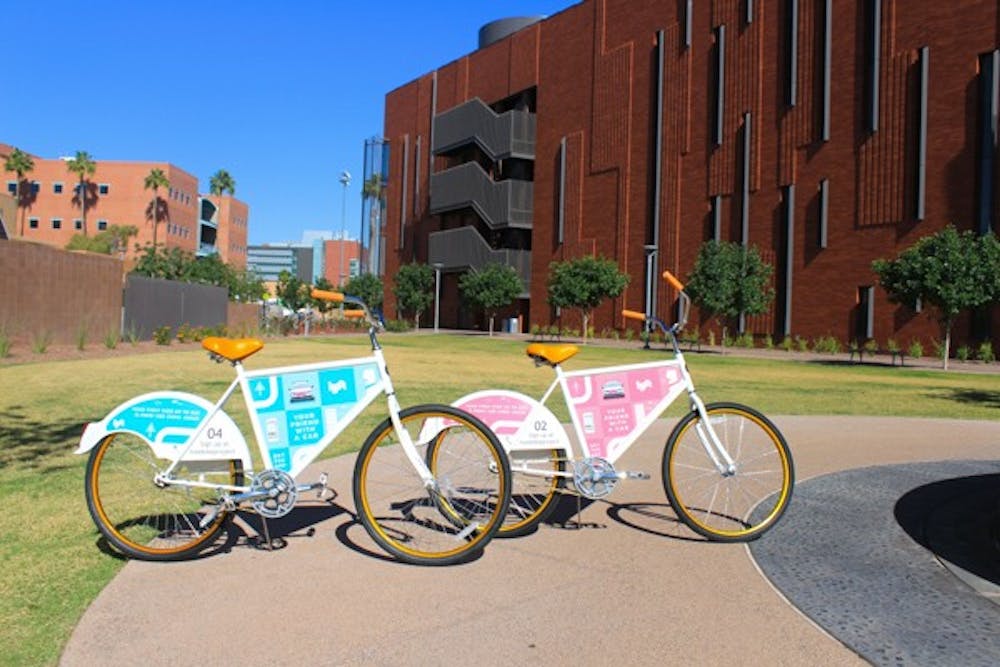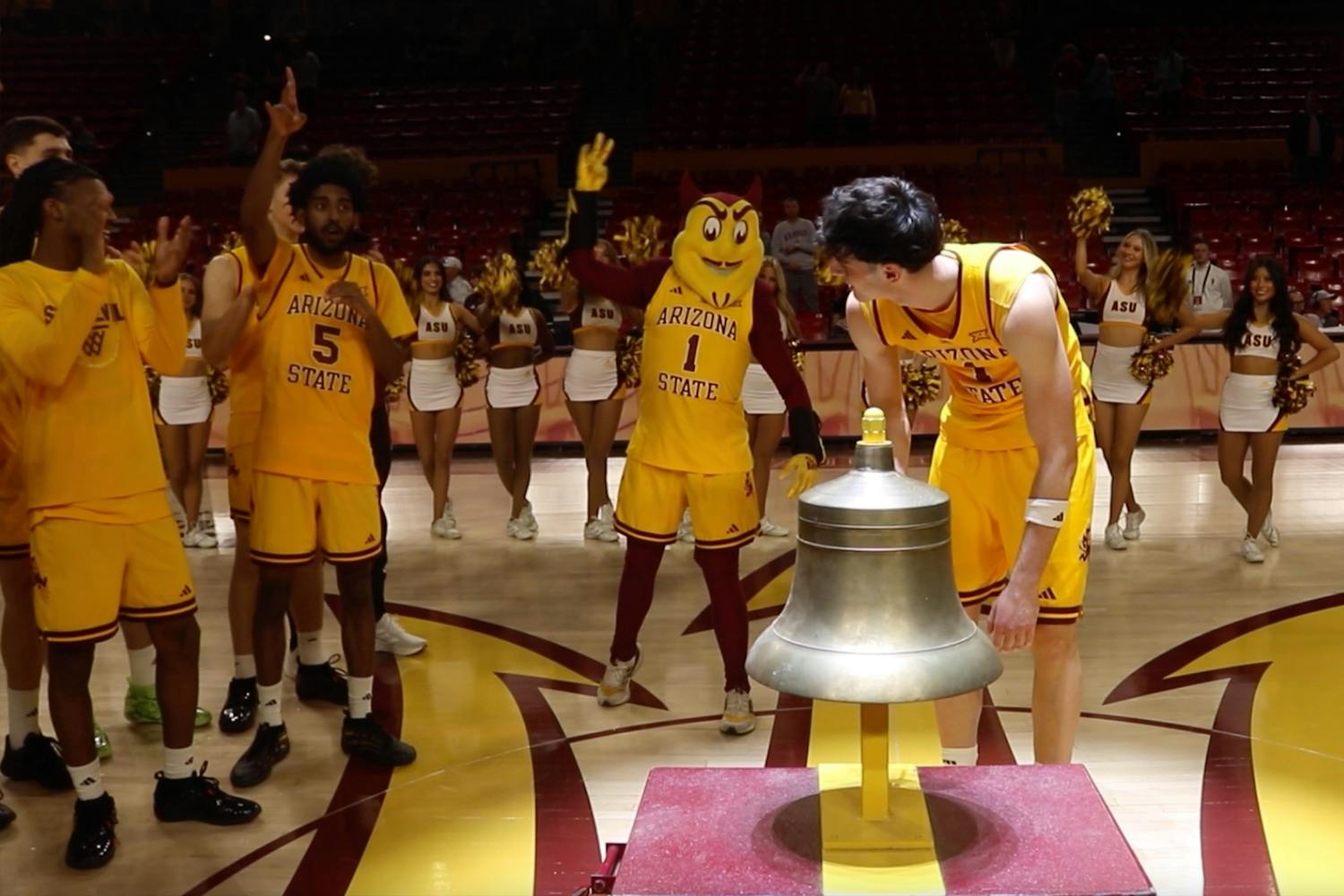 The FreeProject bikes, sponsored by Lyft, sit outside the BAC building on Tempe Campus. (Photo by Micaela Rodriguez)
The FreeProject bikes, sponsored by Lyft, sit outside the BAC building on Tempe Campus. (Photo by Micaela Rodriguez)The Tempe campus has one of the largest concentrations of bicycles in the U.S. and one new company is changing the way students purchase their bikes.
The FreeBike Project is an innovative and new way for companies to connect to students on college campuses, and students have been responding.
Kim Sanderhoff, COO of Free Bike Project, said the idea for the business came to him after seeing how companies were trying to connect to students at his alma mater, USC.
“When I came to USC with a friend of mine named Johan Bender we saw that all of these companies were trying to force people to take their flyers, and it was really annoying and messy and there were all of these bicycles around campus that weren’t being utilized, so we just pretty much put the two things together that benefited everyone,”he said.
Students sign up through the company’s website and place a $99 deposit for the bicycle. The bike is then delivered to the student, and he or she can keep it for as long as they need it while in school.
Each bike is sponsored by a variety of companies, including Lyft, Northface, MySocialCloud and AEG Live.
The company is expanding and has just started distributing bikes to ASU students.
“Right now we have about 400 bikes in circulation spread out on about 20 campuses,”Sanderhoff said. “USC is our biggest with about 50, and then usually it is about 25 per campus. We have tried to keep it low in the beginning to see how it goes.”
CEO Scott Ferreira came on board after being pitched the idea at an entrepreneurship think tank he was holding.
“I just loved the idea, and we were the first company to really sponsor it at USC and give it a try,”he said. “After that I just loved the idea and my company was acquired last year and as I started to look for what was next and I started talking to them and thought this would be a very cool thing to get involved with.”
The social media tie-in with the students and companies is what sets FreeBike Project apart from competitors.
“While they are riding it, the cost of the bike lease is to upload a picture to social media on Facebook, Twitter or Instagram, whatever the student is comfortable with or uses on a regular basis,”Ferreira said.
By uploading pictures to social media, the sponsors receive recognition and in turn the students have an incentive to ride the bicycles.
Not only do students across the country receive bikes but the focus point of the company is to help the impoverished around the globe.
“We donate bikes to the Philippines through a company called Bikes for the World," Ferreira said. “Students like hearing that too, because while you are riding throughout the year, it’s helping to make sure we can donate bikes to people who need them in remote villages all over the world.”
Students also get a sense of pride because they know the true function of the company.
"We are helping students get free bikes and are allowing them to be part of something that is bigger than themselves like being able to help children in the Philippines,” Sanderhoff said.
The Free Bike Project is all about helping others.
“We call it the FreeBike Project, but the free bike project isn’t actually the bike they are getting here, but the bike that is being donated, and most people don’t realize that,”Sanderhoff said.
The ability of students to keep the bikes as long as they are in school adds to the brand recognition that companies want and need from the 18- to 25-year-old age group.
“While students are riding around on these bikes, students across the campus are always seeing them, so companies love that kind of brand awareness," Ferreira said. "But when students upload pictures to social media, it gives us a very tangible way to tell the sponsors ‘Hey,' to Lyft, for instance, we can say, 'It got uploaded by your 200 riders and those 200 riders had more than a million Facebook friends, so it potentially got seen by them also.’”
At the end of the year or after the lease ends, when the company receives the bikes back, the deposits are given back and the donations begin, but not of the exact bikes the students were riding.
“It’s not that exact bike that is given because it wouldn't make sense to make a brand new bike in China and use it for one year here and then ship it right back over there," Sanderhoff said. "That’s not very sustainable, so we ship another bike that is being refurbished but not in circulation."
Team member Arnaud Van de Vondel said the bike has a deposit from a student and once that deposit is paid, the bike is considered theirs and all normal maintenance should be taken care of by the student just like if they bought the bike from a store.
Certain circumstances arise during the year and the company is willing to work with the student to solve problems when they happen, but when the bikes are given back over the summer the company takes over.
“We take care of the bikes in some way because we take the bikes back over the summer,” Vondel said. “So once students go home we take care of their bikes and give them back in September, so we make sure they don’t get messed up or anything.”
FreeBike Project is looking to work with the bike valet on the Tempe campus and with other offices to assure safety of the bicycles and the riders.
The company's growth has been exponential and next fall many more bikes should be expected to be seen on campus, but the focus is and always will be on the social aspect, Ferreira said.
“We really wanted to do something that was socially responsible as well on top of the whole green movement,”Sanderhoff said. “That is why, from the very beginning, we wanted to have the whole social aspect.”
Reach the reporter at jshanco2@asu.edu or follow him on Twitter @joey_hancock
Correction: Because of a reporting error, Arnaud Van de Vondel's name was misspelled in an earlier version of this story.




